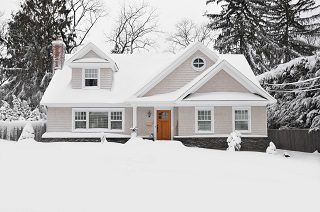
Protecting Your Home from Freeze Risks
While your homeowners insurance might provide protection against some of the damage that bad winter weather might do, it is not all-encompassing. Therefore, you must still do your due diligence and secure vulnerable parts of the home against the potential ramifications of these hazards.
Consider a few of the hazards that might effect your home this winter, and what you can do to protect yourself from them.
What Risk Does Cold Weather Pose to Your Home?
Your house is supposed to be the place you go to escape the cold weather, and it’s built to keep you insulated, and to take a beating from harsh winter weather. However, your dwelling is not invincible, and it can sustain damage when wind blows, temperatures drop, and precipitation freezes.
Just a few of the damage scenarios that might arise during winter weather include:
- Roof damage caused by hard winds, accumulating snow or ice, or falling branches.
- Damage to your gutters caused by accumulated debris or the weight of frozen water.
- Water damage to the home caused by clogged drains or gutters.
- Foundation cracks or collapses caused by ground shifts and the freeze/thaw cycle.
- Burst pipes triggered by water freezing in the line.
- HVAC system and electrical system outages triggered by overuse or poor maintenance.
- Fire risks posed by increased use of fireplaces, stoves, radiators or space heaters.
If your home insurer determines that damage was caused by an unexpected, unavoidable accident (I.e. a tree falling on the home in high winds), then they are likely to cover the necessary repairs. However, if you overstrain your electrical system while a cold front blows through, and short-circuit the system, then you might be forced to pay for the repairs yourself.
As a result, it is better to prepare ahead for winter weather so that you know you’ve done all you can to protect the home. Some of the essential things to do before a cold front strikes include:
- Cleaning out and repairing damage to your gutters. That way, you’ll create a clear path for water to run away from the home, rather than pool around it.
- Wrapping exposed pipes and keeping a small stream of water dripping through them. These steps keep the water in these pipes warm and make it harder for it to freeze.
- Ensure that your HVAC system has no existing damage and monitor your energy usage to ensure that you don’t trip your electrical system through overuse.
- Keep fires, space heaters and other heat sources away from flammable objects.
Additionally, when cold weather beckons, make sure you have the resources at home to keep warm and safe. If you don’t feel secure in your home, then call your local authorities to ask if they can offer any help with getting you the protection you need.
Also Read: What Types of Natural Disasters Does Home Insurance Cover?
Tags: home insurance, winter tips
